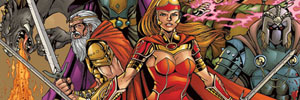G. Brett Williams #9 – The Aces Wild Programme
Aces Wild – It was the 1930s and everywhere you looked, if you knew what to look for, you could see that the world was spoiling for war. The avarice of the 20s had led to the financial collapse of the early 1930s and the Great Depression had left many countries in the world weak and susceptible to totalitarian countries and radical ideals. As the world reeled from the Great Depression, wars popped up all over the planet, with smaller nations falling prey to the machinations of dangerous and powerful conquerors. As the world slipped further into despair and poverty, new threats of the scientific and the strange emerged, only now they were more often than not tied to the ideologies of these various warring nations. What had once been the evils of madmen became the implied “progressiveness” of dangerous nations. Samuel Wilde, in his time as the Wilde Card, had fought men such as Master Midnight, a master magician and scientist bent on furthering his own agenda. That was the order of the day for the 1920s. It was a time of exploration, of opulence, of self-involvement, but the Depression had ended that. Now men of Midnight’s ilk worked for dictators and religious leaders, using their powers and their skills to further deadly agendas. Combating these terrifying new villains with backing from some of the most powerful and wealthy nations in the world would require a special kind of vigilance. It would require a team.
In 1932, Franklin D. Roosevelt was elected President of the United States. His New Deal policies would help combat the continued threat of economic collapse. But what the American people knew nothing about was FDR’s decision to join with the British government in an attempt to reinstate the Wilde Card program. Believing that the failure of the first program could be attributed to their strict insistence on keeping the Wilde Card largely isolated from personal relationships, the British suggested that a team be developed. The team would consist of four people with complimentary skills. The hope was that having to work closely with one another would engender the kind of close relationships in the field that the Wilde Card felt he was missing. They also hoped that having differing opinions and suggestions for how to deal with certain situations would keep the entire team sharp and competitive. The British were contracted to run the program, appointing special officer Nigel Blackthorne to head up the new program, which was now being referred to as Aces Wild. A worldwide search was undertaken and possible team members were culled from various nations friendly to the cause. From China they pulled a martial artist trained in various combative arts. He was a master of barehanded and armed combat, and it was deemed that he would be the Ace of Clubs. From France came a talented and intelligent young adventurer, a woman renowned for her anthropological and archaeological knowledge as well as her ability with a firearm. She would be the Ace of Hearts. America contributed two people to the team. The first was the young heir to the largest munitions developer in America. His family had made munitions for the American armed forces since the Civil War and had done very well for themselves for it. This young man was an engineering genius and preferred to use his family’s money and resources to create gadgets and technology on the fringe of science. He would be the Ace of Diamonds. The second American contribution was something of a mystery. A professional gambler and former soldier, the man was a master with edged weapons. His background was pedestrian compared to the rest, but his connection to the team’s first mission made him invaluable. He would be the Ace of Spades. Those four members would make up the core team and would liaise with various agents and other sympathizers throughout the globe as they carried out their mission to save the world from the terrifying new threats it faced. Each of them was given a codename and they were all strictly forbidden to divulge too much personal information about themselves to one another.










